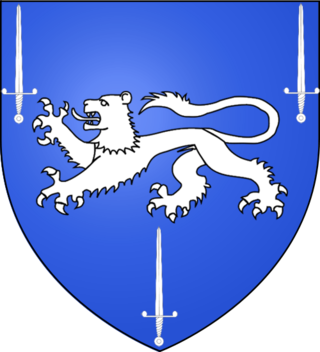Fiachra is an Irish male given name. It may refer to:
Cormac is a masculine given name in the Irish and English languages. The name is ancient in the Irish language and is also seen in the rendered Old Norse as Kormákr.
In Irish mythology, Fiacha, son of Delbáeth, of the Tuatha Dé Danann, was a legendary High King of Ireland. According to the Lebor Gabála Érenn, he took the throne after his father was overthrown by Caicher son of Nama, brother of Nechtan. The Annals of the Four Masters and Geoffrey Keating say he overthrew his father himself. His mother was Ernmas. He had three daughters, Banba, Fódla, and Ériu, by his own mother. He reigned for ten years, before he and his nephew Aoi Mac Ollamain were killed in battle against Éogan of Imber.
Eochaid or Eochaidh is a popular medieval Irish and Scottish Gaelic name deriving from Old Irish ech "horse", borne by a variety of historical and legendary figures.
Fiacha is a name borne by numerous figures from Irish history and mythology, including:
Donnchadh is a masculine given name common to the Irish and Scottish Gaelic languages. It is composed of the elements donn, meaning "brown" or "dark" from Donn a Gaelic God; and chadh, meaning "chief" or "noble". The name is also written as Donnchad, Donncha, Donnacha, Donnchadha and Dúnchad. Modern versions include Donnacha, Donagh, Donough, Donogh and Duncan.
The Dal Fiachrach Suighe were an Irish lineage claiming descent from Fiachra Suighe, the youngest of six sons of Fedlimid Rechtmar. His oldest brother was the legendary High King Conn Cétchathach. They are the ancestors of the Déisi Muman and the Déisi Tuisceart.
Fiachna or Fiachnae is a name borne by several figures from Irish history and legend, including:
The Three Collas were, according to medieval Irish legend and historical tradition, the fourth-century sons of Eochaid Doimlén, son of Cairbre Lifechair. Their names were: Cairell Colla Uais; Muiredach Colla Fo Chrí ; and Áed Colla Menn. Colla Uais ruled as High King of Ireland for four years. Recent DNA analysis confirms the history of the Three Collas in fourth-century Ireland, but questions their descent from Eochaid Doimlén and Cairbre Lifechair.
Fergus or Feargus is a common and one of the oldest known Scottish or Irish male given name derived from Old Irish, meaning "the strong (one)" or "the masculine (one)".
Cathal is a common given name in Ireland, spelled the same in both the Irish and English languages. The name is derived from two Celtic elements: the first, cath, means "battle"; the second element, fal, means "rule". There is no feminine form of Cathal. The Gaelic name has several anglicised forms, such as Cathel, Cahal, Cahill and Kathel. It has also been anglicised as Charles, although this name is of an entirely different origin as it is derived from a Germanic element, karl, meaning "free man".

Aodh is a masculine Irish and Scottish Gaelic given name, which was traditionally anglicized as Hugh. The name means "fire" and was the name of a god in Irish mythology.
Hugh is the English-language variant of the masculine given name Hugues, itself the Old French variant of Hugo, a short form of Continental Germanic given names beginning in the element hug- "mind, spirit".

Tubridy, less commonly known as Tubrid and Tuberty, is a Gaelic Irish clan from Munster. The sept is most common along the West Coast of County Clare, but has also had some presence in County Waterford and County Tipperary. The Tubridys of Thomond are thought to have originated as scribes, as a sept of the Dál gCais, kindred to clans such as the O'Brien, O'Grady and MacNamara. The name means "descendant of Tiobraide", with the Gaelic language word tiobraid meaning "a well". Although to this day, Ireland remains the core location for the clan, it has also spread in diaspora to Great Britain, the United States, Australia, New Zealand and Canada since the 19th century.

MacGorman, also known as McGorman, Gorman, or O'Gorman, is an Irish Gaelic clan based most prominently in what is today County Clare. The paternal ancestors of the clan are of the Laigin and emerged in what is today County Waterford. As leaders of the Uí Bairrche, they competed with the Uí Cheinnselaig in the 5th century for the Kingship of Leinster, ultimately losing out in that specific arena, but holding on to significant lands in the Leinster area.
The surname Gaughan is derived from the Old Gaelic name Ua Gáibhtheacháin, which dates to before the 10th century. Its meaning is "male descendant of a fierce warrior". However, other translations claim it means "anxious one", demonstrating their expeditious and industrious nature. Historically, Irish families were named after the first chief of their tribe. In this case, it is evident that this clan descends from an illustrious warrior. Other derivatives of Ua Gáibhtheacháin are: O'Gaughan, Gavan, Gavaghan, Gavahan, Gavigan and Gahan.
Murchadh is masculine given name of Irish origin, used in the Irish and Scottish Gaelic languages.
Angus is an English language masculine given name. It is an Anglicised form of the Irish and Scottish Gaelic name Aonghas, which is composed of Celtic elements meaning "one" and "choice". Short forms of the name include Gus, which may be lengthened to Gussie, and Irish Naos. Angie is a common pet form of the name. The feminine form of Angus is Angusina.
Dolan is a surname of Irish origin. The name Dolan is fairly common today in Ulster, particularly in Cavan, Fermanagh and Tyrone, and also in the Connacht Counties of Roscommon and Galway. The latter is the place of origin of this sept which is a branch of the Ui Máine specifically in the Clonmacnowen Barony in Galway and in the Barony of Athlone in Roscommon.
Saint Fland Feblae mac Scandláin was the Bishop of Armagh, Ireland from 688 to 715.
Fiach is an Irish male given name. It may refer to: